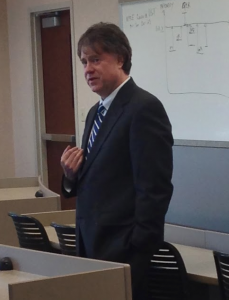St. Thomas School of Law professor Mark Osler was profiled in Rolling Stone magazine in early October about his advocacy for the elimination of mandatory drug sentencing minimums.
The magazine reached out to him because it was pursuing a story about long-term prisoners, and one of his clients was featured, Osler said. From there, he met up with a reporter stationed in New York while he was there on business.
Osler began his career as a prosecuting attorney who used the mandatory drug sentencing minimum guidelines to put those in possession of drugs in prison and win his cases.
However, a change of heart prompted Osler to switch sides and seek a different kind of justice. A former recurrent defending attorney against Osler’s cases made a speech referencing the biblical scene of Jesus’ crucifiction that stuck with him and convinced him to change his position.
He said sometimes moments of clarity and purpose come unexpectedly.

“Sometimes when we do the most important thing we ever do, a lot of times we don’t realize it at the time,” Osler said.
Osler, who is from Detroit, initially saw strict sentencing as a good way to control selling illegal drugs.
“Crack did terrible things to (Detroit), and it seemed to me that tough sentences would deter people from selling crack,” Osler said. “I was wrong.”
He now focuses on alternative ways to address narcotics outside of mass incarceration, and he continues to advocate because he said he feels that there is more to be done. Osler argued that going forward, the money should be the target, not the individuals.
“We need to identify what we are going to be doing about narcotics if it isn’t going to be incarcerating a lot of people,” Osler said. “Narcotics are a real and serious social problem; they’re destructive of families, individuals and communities.”
Osler said in the 1980s, crack use affected people dramatically, which prompted the courts to create strict guidelines known as the 100-to-1 ratio. This ratio was based on weight and meant that in sentencing, one gram of crack a person possessed was equivalent to 100 grams of powder cocaine. Possessing 500 grams of powder cocaine would warrant a mandatory minimum of five years in prison without parole; however, possessing just 5 grams of crack would bring the same sentence, he said.
But Osler helped change that. In 2009, he won the Supreme Court case Spears v. United States that gave judges the right to reject the 100-to-1 ratio and choose his or her own ratio if the original standard seemed too harsh.
After the court decision, Osler said the Spears case played a large role in evolving laws about mandatory minimum sentences. In 2010, Congress passed the Fair Sentencing Act that changed the 100-to-1 ratio to a less strict 18-to-1. However, the Spears decision is still in effect, meaning judges have the liberty to lower a charge if they feel the ratio is too harsh. Osler said judges have used the case often.
“There has been further downward action in the guidelines,” Osler said. “We really are seeing this reaction to the harshness of federal sentences.”
Since the Spears case, Osler’s focus has been on the country’s first commutation clinic that he started at St. Thomas. As part of the clinic, students work with federal inmates to petition for leniency on their sentences. He said the clinic has inspired the creation of others across the country and is now a central part of his work. The clinic demonstrates what the prisoners profiled in Rolling Stone now have a chance at, thanks to Osler.
“All clemency is is telling the rest of someone’s story, when they are completely defined by the worst thing they have ever done,” Osler said. “There’s this one point in time where they are doing something awful and the rest of their life, especially since that point, goes untold.”
Graduate Deborah Walker spent a year working in the clemency clinic, and she explained the clinic’s impact.
“Among many other things, it gave me a glimpse into the legal system from a perspective completely different than my own. The system can be so merciless,” Walker said. “I see all convicted individuals differently because of it.”
Graduate student Eric Hylok is one of Osler’s current students and agreed the system of mandatory minimums in place now doesn’t make sense.
“Professor Osler has shown me that finding justice that is balanced both individually and for society as a whole is only possible when being cognizant of the effects each have on one another,” Hylok said.
Hylok said Osler’s impact on the topic is hard to capture but is certainly substantial.
“He is not working miracles. He is simply bringing to light issues that should already have been discussed and addressed but have not been,” Hylok said.
As for being published in such a prominent magazine, Osler is simply interested in getting his message across to others and reaching out to different types of media to do so. He said he doesn’t turn down anyone who wants to talk.
“If we want to reach a broader audience, if we want to create social change, we need to find new media, and I think sometimes that means working through things like the Star Tribune or The New York Times,” Osler said. “And sometimes it means talking to things like the Rolling Stone.”
Lauren Smith can be reached at smit7607@stthomas.edu.

